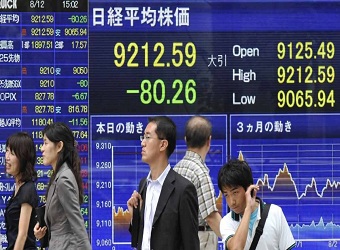Asian stocks rallied as concerns over a potential trade war faded on Tuesday, with gains in the region led by Japan’s benchmark Nikkei.
Japan’s Nikkei 225 jumped 2.14 percent, or 450.83 points, with the dollar extending gains against the yen as trade-related fears abated. The dollar fetched 106.31 yen at 12:44 p.m. HK/SIN after falling as low as 105.34 in the overnight session.
Exporters gained on the firmer dollar, with automakers, technology and manufacturers higher for the most part. Other large caps also recorded significant gains, with Fast Retailing up 3.03 percent.
Over in South Korea, the benchmark Kospi advanced 1.32 percent, with gains seen across sectors, including chipmakers. Tech heavyweight Samsung Electronics jumped 3.76 percent and SK Hynix was up 5.24 percent.
Hong Kong’s Hang Seng Index gained 1.39 percent after the index slipped below the 30,000 level in the last session. Shares of Tencent, the most heavily weighted stock on the index, were up 2.82 percent, as other large caps also put in a strong showing. Insurer AIA rose 2.24 percent and China Construction Bank tacked on 1.41 percent.
Gains on the mainland were smaller, with the Shanghai composite edging up by 0.21 percent and the Shenzhen composite adding 0.67 percent. Elsewhere, the S&P/ASX 200 rose 1.13 percent, with all 12 of its sub-indexes trading in positive territory.
Elsewhere, the S&P/ASX 200 rose 1.13 percent, with all 12 of its sub-indexes trading in positive territory.
The energy and materials sectors were among the best-performing sectors, rising 1.83 percent and 1.75 percent, respectively, while the heavily weighted financials sub-index gained 0.87 percent.
In individual stocks, Japan’s Kobe Steel rose 0.63 percent. The company’s Chief Executive Officer Hiroya Kawasaki is slated to step down after a data falsification scandal that erupted last year, Reuters reported, citing Nikkei.
Meanwhile, energy-related stocks and oil producers in the region rose as oil prices held onto gains after settling 2.2 percent higher in the last session. Australia’s Woodside Petroleum went up 1.61 percent and Japan’s JXTG Holdings advanced 4.02 percent, while shares of CNOOC listed in Hong Kong popped 4.44 percent.
U.S. West Texas Intermediate edged up 0.16 percent to trade at $62.67 after settling 2.2 percent higher on Monday. Brent crude futures climbed 0.15 percent to trade at $65.64.
Stateside, the Dow Jones industrial average gained after four straight days of losses, which came after Donald Trump’s announcement last week that tariffs would be implemented on steel and aluminum imports.
The tariffs encountered push back from Republican House Speaker Paul Ryan, who said he was “extremely worried” about the plan. In response, Trump indicated he would not back down from his decision.
Trump on Monday also appeared to signal those tariffs could be open to negotiation, tweeting that the tariffs will not be implemented if a “fair” NAFTA agreement is reached.
U.S. stock indexes recorded gains of more than 1 percent, with the Dow closing up 336.70 points, or 1.37 percent. Elsewhere, European markets appeared to shrug off concerns over the prospects of a hung parliament in Italy.
“Investors were relieved that China did not retaliate over the weekend but with President Trump singling out China by calling them ‘the biggest problem,’ it’s only a matter of time before the Asian giant responds,” Kathy Lien, managing director of FX strategy for BK Asset Management, wrote in a note.
The dollar index, which tracks the greenback against a basket of currencies, slipped to trade at 89.950 at 12:37 p.m. HK/SIN after climbing above the 90 handle in the last session.
Meanwhile, the Australian dollar last traded at $0.7778, above Monday’s close of $0.7761. Reactions in the currency to the Reserve Bank of Australia’s decision to hold rates steady, a move widely expected by markets, was fairly muted.
Source: CNBC


